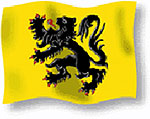Region
| Bretagne (FR) | Navarra (ES) | Puglia (IT) |
| Flanders (BE) | Nyugat-Dunantul (HU) | Schleswig-Holstein (DE) |
| Lower Austria (AT, lead partner) | Provence-Alpes-Côte d´Azur (FR) | Wielkopolska (PL) |
Flanders (BE)

Flanders (Flemish Region) covers 44.8% of Belgium's 30,528 km2 and accounts for some 60% of the total population. Home to the majority of the country's industry and workforce, the region also generates the major part of national trade: the Flemish GRP (Gross Regional Product) provides 60% of the national GDP.
Flanders has benefited from centuries of being located exactly where Europe's three major cultures - Anglo-Saxon, Germanic and Latin - meet. Its historic place at the crossroads of European trade has created an enterprise culture that thrives on the challenges of today's constantly changing international business environment.
Flanders Belgium Capital Brussels Brussels National Languages Dutch Dutch, French, German Area 13,522 km² 30,528 km² Population 6,117,440 10,584,534 Number of Companies 438,300 722,191 Currency euro (EUR) euro (EUR) With a successful history of discovery research and innovation across a range of disciplines and a variety of sectors, Flanders offers businesses a knowledge-based economy with a highly educated and innovative population. Some 26% have had higher education. Government and industry are placing increasing emphasis on research and development in areas that are traditional in nature (such as logistics), discovery-based (such as the life sciences) or futuristic (such as nanotechnology).
Spending on R&D in Belgium as a whole is growing as a percentage of GDP, reaching 2.33% last year. In Flanders, business accounts for 73% of that spend.
In specific areas such as the ICT cluster close to Leuven University, R&D spending is among the highest in Europe at $7.011 per employee. The life sciences are also strongly represented in R&D spending, notably through Janssen Pharmaceutica, but also through other pharmaceutical, medical device and medical imaging companies along with more than 40 biotech firms. Some 16% of patents held in Flanders are in the life sciences.
Other major sectors such as the automotive industry also have strong research bases in the region, much of it in-house but with the universities and specialist research institutes all playing a role that is often linked closely with companies. Research cooperation between universities and companies in Belgium is relatively high at 4.5 on a scale of one to seven (Global Competitiveness Report, 2005). Leuven and Ghent universities are ranked in the 10 best research centers in the world (The Scientist, 2003) while the independent research center IMEC, also at Leuven, is a world leader in nanotechnology and microelectronics.
To encourage innovation and research and development, Flanders offers companies a variety of incentives that include as tax breaks for R&D personnel and funding for specific projects proposed by businesses.
Managing Authority for the Regional Operational Program in Flanders is "Agency for Economy - Division Europe Economy". This organization is giving full support to IWT in performing roles and tasks as set up in the project work program and supports the development of a regional action plan within SCINNOPOLI with the aim to transfer implement and mainstream Good Practices after the lifetime of the project financed by the Structural Funds program.
IWT was project coordinator for IMPACTSCAN (2005 – 2008), one of the good practices to be transferred in Scinnopoli.
